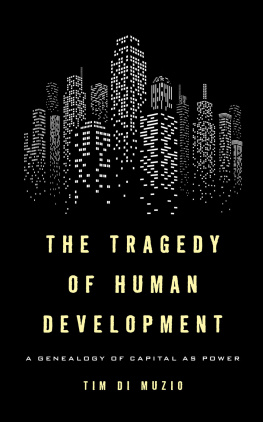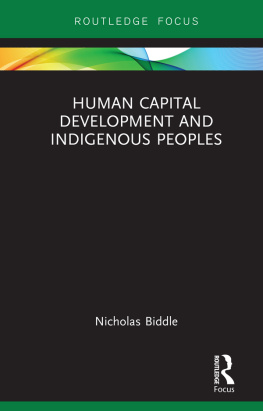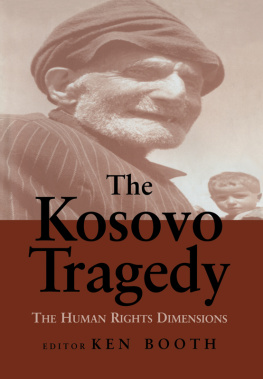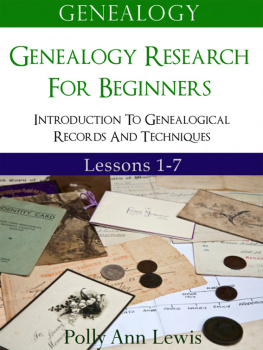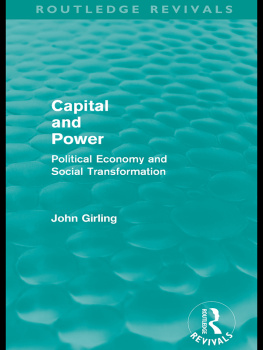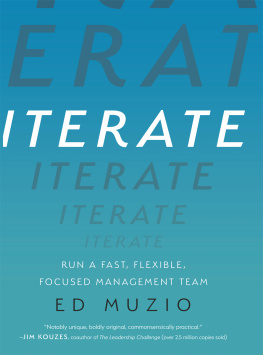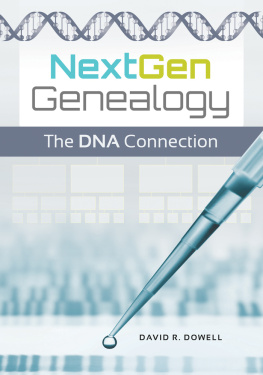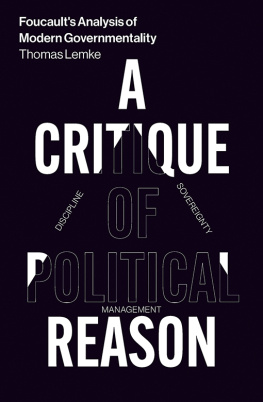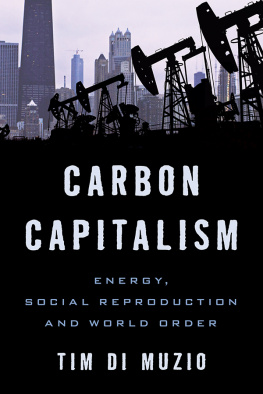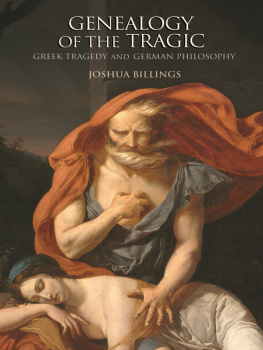Di Muzio - The tragedy of human development : the genealogy of capital as power
Here you can read online Di Muzio - The tragedy of human development : the genealogy of capital as power full text of the book (entire story) in english for free. Download pdf and epub, get meaning, cover and reviews about this ebook. year: 2018, publisher: Rowman & Littlefield International, genre: Science. Description of the work, (preface) as well as reviews are available. Best literature library LitArk.com created for fans of good reading and offers a wide selection of genres:
Romance novel
Science fiction
Adventure
Detective
Science
History
Home and family
Prose
Art
Politics
Computer
Non-fiction
Religion
Business
Children
Humor
Choose a favorite category and find really read worthwhile books. Enjoy immersion in the world of imagination, feel the emotions of the characters or learn something new for yourself, make an fascinating discovery.
The tragedy of human development : the genealogy of capital as power: summary, description and annotation
We offer to read an annotation, description, summary or preface (depends on what the author of the book "The tragedy of human development : the genealogy of capital as power" wrote himself). If you haven't found the necessary information about the book — write in the comments, we will try to find it.
Di Muzio: author's other books
Who wrote The tragedy of human development : the genealogy of capital as power? Find out the surname, the name of the author of the book and a list of all author's works by series.
The tragedy of human development : the genealogy of capital as power — read online for free the complete book (whole text) full work
Below is the text of the book, divided by pages. System saving the place of the last page read, allows you to conveniently read the book "The tragedy of human development : the genealogy of capital as power" online for free, without having to search again every time where you left off. Put a bookmark, and you can go to the page where you finished reading at any time.
Font size:
Interval:
Bookmark:

Published by Rowman & Littlefield International Ltd
Unit A, Whitacre Mews, 2634 Stannary Street, London SE11 4AB
www.rowmaninternational.com
Rowman & Littlefield International Ltd. is an affiliate of Rowman & Littlefield
4501 Forbes Boulevard, Suite 200, Lanham, Maryland 20706, USA
With additional offices in Boulder, New York, Toronto (Canada), and Plymouth (UK)
www.rowman.com
Copyright 2018 by Tim Di Muzio
All rights reserved. No part of this book may be reproduced in any form or by any electronic or mechanical means, including information storage and retrieval systems, without written permission from the publisher, except by a reviewer who may quote passages in a review.
British Library Cataloguing in Publication Data
A catalogue record for this book is available from the British Library
ISBN:HB 978-1-7834-8713-4
PB 978-1-7834-8714-1
Library of Congress Cataloging-in-Publication Data Is Available
Names: Di Muzio, Tim, author.
Title: The tragedy of human development : a genealogy of capital as power / Tim Di Muzio.
Description: London ; New York : Rowman & Littlefield International, Ltd., 2018. | Includes bibliographical references and index.
Identifiers: LCCN 2017041092 (print) | LCCN 2017054303 (ebook) | ISBN 9781783487158 (Electronic) | ISBN 9781783487134 (cloth : alk. paper) | ISBN 9781783487141 (pbk : alk. paper)
Subjects: LCSH: CapitalismPolitical aspects. | Power (Social sciences) | Money. | Accounting. | Right of property.
Classification: LCC HB501 (ebook) | LCC HB501 .D4625 2018 (print) | DDC 330.12/2dc23
LC record available at https://lccn.loc.gov/2017041092
 The paper used in this publication meets the minimum requirements of American National Standard for Information SciencesPermanence of Paper for Printed Library Materials, ANSI/NISO Z39.481992.
The paper used in this publication meets the minimum requirements of American National Standard for Information SciencesPermanence of Paper for Printed Library Materials, ANSI/NISO Z39.481992.
Printed in the United States of America
For Amanda, Michaela, Vince, Ryann, and Mitch.
May your minds be wide open and your hearts lead you on.
No book is easy. The present work was largely inspired by my last study on the rise of a global petro-market civilization and what I called carbon capitalism. Therein I explored the transition to fossil fuels as an historical exception, tracing it through Britain, the United States, and capitalist world order more broadly. Given the nonrenewable nature of fossil fuels and the elite penchant for building more energy-soaked built environments, I argued that we are headed toward a general crisis of social reproduction where energy-intensive lifestyles will no longer be reproducible. I concluded the book with the following phrase: After all it would be the ultimate tragedy of human development if the history of the human race proved to be nothing more noble than the story of an ape playing with a box of matches on a petrol dump (Di Muzio 2015b: 171). The phrase tragedy of human development seemed to flow naturally from my analysis, and I barely gave it a second thought until the book arrived in hard copy months after those words were written. Upon rereading the book, the phrase jumped out at me in bolder reliefs: what would it mean to conceive of human developmentindeed our history as a speciesas a tragedy? It seemed an open and interesting question, particularly given other renderings of human history as progress or catastrophe. The philosopher Walter Benjamin (18921940) had already declared human history one giant catastrophe, a radical statement if there ever was one and a somber philosophy of human affairs given our many achievements. The other extreme is the liberal, progressive view of history as a stadial exercise in human betterment finally realized in a commercial society. Our liberal friends do not always deny the atrocities of the stadial history they recount, but they are heavily discounted. It always seemed to me that this reading of history was far too optimistic and far too injudicious. Too optimistic in the sense that there is a liberal tendency to believe that capitalism and the price mechanism of the market will come to our rescue at every turn, if only in the long run for some. Too injudicious in the sense that our liberal friends are happy to somewhat acknowledge the horrible events of our history but like good capitalists are happy to write off or write down these events because it stops them from looking forward. Between these two extremescatastrophe and progressI believe we find tragedy. I will explain what I mean in greater detail later but for now allow me a few words about the subtitle of this book: a genealogy of capital as power. What I want to demonstrate in this bookif only in outlineis the emergence of a historical contradiction between the logic of differential accumulation, which aims for the greater inequality of power, income, and wealth and the logic of livelihood that is mostly concerned with acquiring those things most closely associated with a decent life. While they overlap, I will argue that these logics are fundamentally at odds and the crux of the tragedy of human development. In a word, the tragedy results because the logic of differential accumulation operates in the interests of the very few and supersedes the logic of livelihood. The weapons of differential accumulation are monetization, commodification, ownership and exclusion, and, ultimately, capitalization and war. We are so used to these weapons that few of us stop to question their historical emergence. They are taken as self-evident, a part of the natural world, as though things have always been this way. But things have not always been this way. In this light, the task I have set for myself in this study is to then, if not fully trace their emergence in all their geographical and historical complexity, at least provide somewhat of a guideline for future study. The task has not been easy given the scale of human history covered in this book and the still mounting array of literature scattered across disciplines. As the reader will be able to tell from the references, this book has been built on the shoulders of giants but it has also no less been constructed on the back of those whose work is lesser known but without which, we would know far, far less about ourselves and our world. I owe a great deal of intellectual debt to their work. But while this book has engaged literature across disciplines, at base it is wholly a work of critical political economy, that master social science that refuses to believe that politics and power can be separated from capitalist accumulation, the price mechanism of the market, and the increasing concentration of wealth and power so prevalent today. This book will have silences, gaps, and disappointments, but I hope these are at least matched by new discoveries, novel arguments, and new questions in need of answers. Ultimately, and whatever the shortcomings of this book, I think we must ask ourselves if it is possible for the logic of livelihood to triumph over the logic of differential accumulation. I will take up this question toward the end of this work when I discuss the biopolitics of global capitalism. But for now it is time to end this foreword and get to the task at hand. For after all, the hurricane of our history cannot roar in opening words alone.
Tim Di Muzio
Sydney, Toronto, Brussels, Paris
While the act of researching and writing can be a solitary effort, it is seldom done entirely alone. A debt of gratitude is owed to many peopleliving, dead and those whom I have not met but whose work I engage. It is impossible to name everyone but I do want to acknowledge the following people. My greatest debt is to Matt Dow who is an exemplary researcher. Without his help this book would not have been possible. I also thank Hanna Kivist for her patience and thoughtful discussions throughout the period I was engaged with this project. My best friends Tony Guindon and Art Piatek were exemplary hosts in both Toronto and Brussels and they contributed to this book more than they are likely aware. Stephen Gill and Isabella Bakker are a constant source of inspiration and I thank them for their hospitality and our discussions up at the Pines when I returned to Canada on study leave. I owe a debt of gratitude to Tim Onslow for countless discussions, Sydney nights filled with music and for sorting the index. My family both immediate and extended were also a constant source of support and encouragement. Last I want to thank my colleagues and students at the University of Wollongong who have helped make life on campus pleasant and intellectually engaging.
Font size:
Interval:
Bookmark:
Similar books «The tragedy of human development : the genealogy of capital as power»
Look at similar books to The tragedy of human development : the genealogy of capital as power. We have selected literature similar in name and meaning in the hope of providing readers with more options to find new, interesting, not yet read works.
Discussion, reviews of the book The tragedy of human development : the genealogy of capital as power and just readers' own opinions. Leave your comments, write what you think about the work, its meaning or the main characters. Specify what exactly you liked and what you didn't like, and why you think so.

